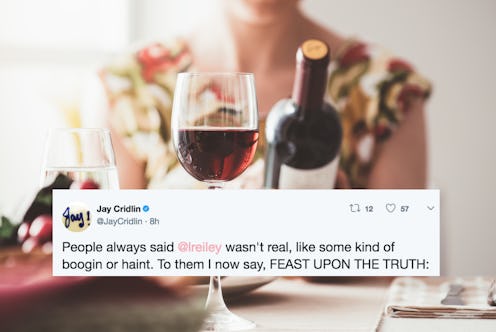Life
A Food Critic Kept Her Real Identity Secret For So Long People Thought She Wasn't Real
Food critics are notoriously surreptitious about their true identities, allowing them to dine at restaurants without alerting the staff to step up their game for a good review. But one local critic in Tampa, Florida says she's tired of living in the shadows, and she revealed her identity in a column for the Tampa Bay Times on Monday. Plus she had a "coming out" party, with cake!
Laura Reiley's been an anonymous food critic since 1991, having spent the last decade writing up restaurants and other eateries for the TB Times. "The rationale for anonymity is this: It allows a food critic to be like every other diner, to have the same kind of experience the guy at the next table is having. And that’s the point," she wrote in Monday's column. "[W]hile stage performers may know that a critic is out there taking crabbed notes in the dark, they seldom interact with the critic directly. A restaurateur, once a critic has been spied, can heap on the food, assign the best waiter, hover over every need."
But Reiley says that the time has come for her to be unmasked, and though she still wants to write about food, she thinks coming out from behind the curtain will make it easier for her to deepen her beat. "I believe there’s never been a more important time to write about food," she writes. "Just as more people care about the provenance of what they eat, the food system has become infinitely more complex and opaque and the institutions for policing such things have become weaker."
Here is her face above a cake:
The Internet seems to be having a good time with her reveal. "People always said @lreiley wasn't real, like some kind of boogin or haint. To them I now say, FEAST UPON THE TRUTH," Reiley's TB Times colleague, Jay Cridlin, tweeted. TB Times reporter Chelsea Tatham added, ".@TB_Times food critic @lreiley finally reveals herself and no, she doesn't look like her previous fork avatar."
Reiley noted that while she will no longer hide from chefs and restauranteurs, she will continue to uphold journalistic ethics as set forth by her paper. "I will still make reservations under other names and visit restaurants unannounced. I won’t take anything for free and the Times will pay for my meals. And if I am 'made' at a restaurant? I’ll discourage hovering, will watch the service and portion sizes of those around me (tip to restaurateurs: more is not always more in my book), and will hope that everyone involved comports themselves with dignity and professionalism," she wrote.
But Reiley points out that it's hard for journalists to chase stories without showing their faces — indeed, the most important thing a journalist can do is show up at the scene and ask questions. I once spent an entire evening outside a housing complex in Queens to report on a story about a local election, since though spokespeople are good for getting statements from representatives, the real news is out on the streets. If you can't talk to people face-to-face to find out about, say, the nation's struggling independent farms, or what's happening with genetically-modified foods, or whether or not high-fructose corn syrup is destroying our insides, you're not getting the whole story.
And while it's important that folks reading restaurant reviews get the full picture and not one specifically curated for reviewers, good restaurants do usually know roughly what reviewers look like. Though some of the PR folks Reiley dodged by staying undercover were impressed she managed to elude them for so long:
Clark Kent could take a few notes from Reiley, that's for sure.
